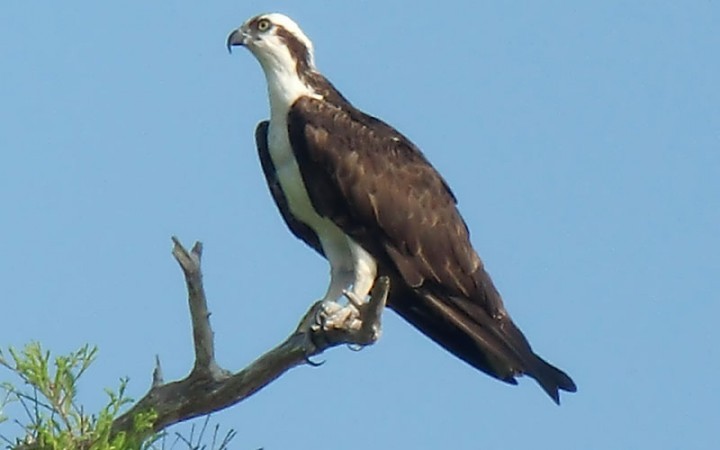
INDIAN RIVER COUNTY — The county’s oldest and most effective environmental advocacy organization is launching an effort to attract more members on the barrier island through a new series of talks.
“We have more than 700 members, but only about 160 of them live on the island and we think it is important to increase that number,” says Pelican Island Audubon President Dr. Richard Baker.
The group, which was founded in the early 1960s to preserve the area around Pelican Island National Wildlife Refuge from development, will begin holding monthly meetings with speakers on the island this month at the City’s Riverhouse in MacWilliam Park south of the Barber Street Bridge.
Talk subjects range from bird banding as a research tool to seeking a global solution to climate change to and bird art through centuries, considering images dating back 40,000 years.
Audubon will also be promoting a series of boat excursions at Blue Cypress Lake, where the largest population of Ospreys in the world can be seen from the comfort of a pontoon boat stocked with drinks and snacks, with tours conducted by Ph.D. scientists and researchers. Field trips to other important ecological destinations in Florida will also be offered.
The island initiative is part of Audubon’s steady expansion in recent years.
In 2011, the group began monthly meetings at the North County Library in Sebastian that are now attended by as many as 150 people, more than attend the longstanding monthly meetings in at the Vero Beach Community Center.
In April, the group completed a new headquarters and community education center in the Oslo Conservation Area on the western shore of the Lagoon in South County. It held an ecology summer camp for children there last year and is now conducting a ground-breaking after-school environmental education program for students from four Title 1 schools at the facility, which was built to resemble a birdhouse.
Launched in September with an $18,000 runner-up grant from Impact 100 and donations from Audubon members, the program takes place at Audubon House and out on the lagoon for two hours each afternoon, Monday through Thursday.
“Twelve students from each school attend one day a week, from 3:30 to 5:30,” says Baker. “There is one teacher from each school who stays with their group throughout the 22-week program. Teachers at each school picked the children who are participating based on their academic excellence and interest in science.”
After excursions on the lagoon, the children return to Audubon House to journal about their activities and sketch elements of the natural world they have seen.
“We brought in an art teacher and a journalism teacher to instruct them in writing and drawing,” Baker says.
Audubon has applied for another Impact 100 grant, hoping to be awarded $100,000 this year to expand the program from 48 to 250 children.
After leading the effort to preserve the land around Pelican Island, the group went on to organize the first U.S. coastal cleanup effort, which was recognized by the U.S. Department of Interior and has since become an international movement; helped pass laws to keep beaches dark during turtle nesting season to protect hatchlings; founded the Environmental Learning Center; led in the effort to pass $136 million in county bond issues used to buy 9,700 acres of conservation land; stopped the county’s ill-conceived effort to do a dredge and fill project at Oslo Boat Ramp; and launched “a wildly successful program that placed more than 90 gardens in 13 county elementary and middle schools to teach children the benefits of growing their own vegetables in a way that is economical, efficient, conserves water and energy, eliminates use of pesticides, teaches good nutrition to students and their families and reconnects children with nature.”
The next talk in the new series is February 22, 2016 at 6:00 pm. Rachel Stewart will talk about The Climate Reality Project, an effort to catalyze a global solution to the climate crisis by making urgent action a necessity across every level of society. Stewart gives hope by talking about how we can work together to find practical solutions to have a healthy tomorrow replacing fossil fuels with clean reliable and affordable renewable energy for all. The Climate Reality Project is a diverse group cultural leaders, marketers, organizers, scientists and storytellers who have come together to help solve the greatest challenge of our time.



